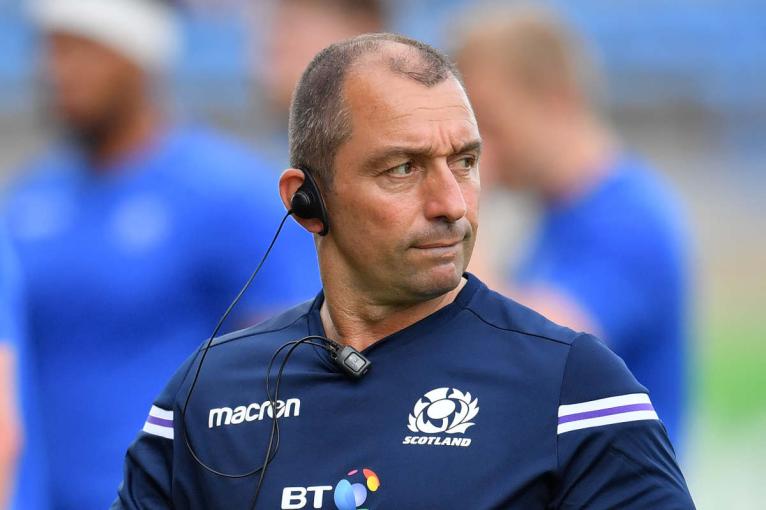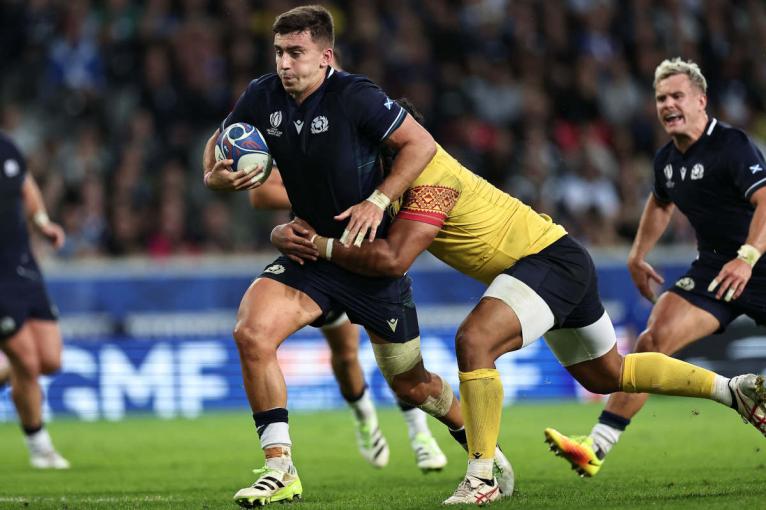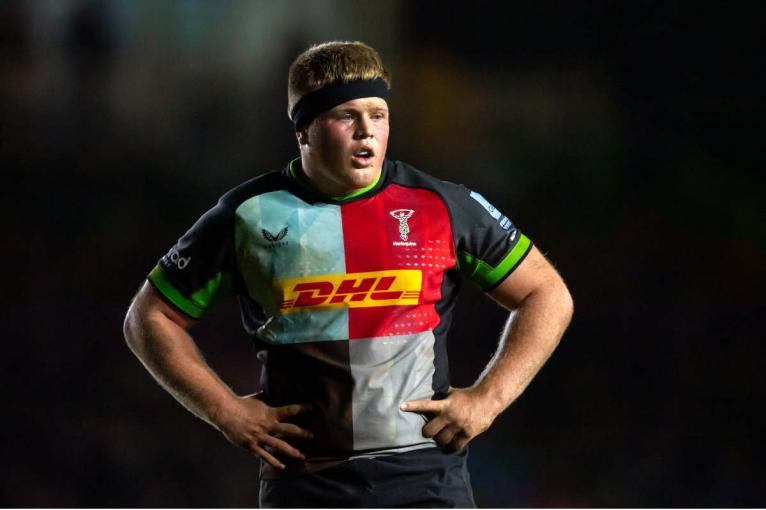When Bryan Redpath made his way through Scottish rugby from club success to the launch of pro rugby, to France and then the top of the English Premiership, the development of rugby talent seemed a simple affair.
Players who impressed at school and club level were picked up and given the chance to test themselves at the county/district/provincial tier. If they stood out there it was often just one more step to pulling on an international jersey. Of course, selection and injury always throws spanners in the mix, but three tiers were easy – for players and the rest of us – to get their heads around.
For Redpath’s own sons, Cameron and Murray, brought up in England, the performance pathway has been not too dissimilar, from school to club academy and then senior rugby.

Cameron, 23, has excelled, going on to star at Bath, having been exposed to a greater intensity with England age-grade sides before switching allegiance to his parents’ country and playing in the Six Nations and recent Rugby World Cup. Scrum-half Murray was firmly in Scotland’s sights as a teenager but has opted to focus on a degree at Newcastle University for now. The 21-year-old remains very much on Scotland’s radar, however.
Had Redpath senior returned to Scotland, he knows that his sons may have been lost to rugby, such is the natural wastage that occurs in a system with just two pro teams and precious few academy places. Sharing the name of a former Scotland captain with his connections in the game may have helped, but Redpath shakes his head at the minefield Scottish rugby has become for young talent.
These boys will be working really hard on their skills, their fitness and power, but they never see a ball in anger: from 16 on, they play hardly any games that mean anything.
“I speak to a lot of people in Scotland,” he says, “and there is definitely a lot of concern at the lack of development of our own young players, and I just find that so sad. Yes, when I came through as a player it was a very different world, and it was pretty straightforward. I am glad I played when I did, because you look at it now and it’s hard to see the path that a good young player takes.
“Many don’t even get the chance to play for Scottish clubs, and develop alongside the older guys that school you, and enjoy that camaraderie, because they get picked up at 15 or 16 and put into the union’s academy structure. That would be fine if they then came out of it, but you don’t see many coming out into the Edinburgh or Glasgow squads. Instead, that’s when I get contacted by boys pretty disillusioned and wanting to try their luck in England.
“It’s not their fault. There’s lots of great young talent in Scotland, and these boys will be working really hard on their skills, their fitness and power, but they never see a ball in anger: from 16 on, they play hardly any games that mean anything. And then we expect them to win games at age-grade or emerge at 20 or 21 ready to play pro rugby in the URC or Europe? We really need a closer look at it and to bring people from all levels together to look at how we can change and develop a clearer path again.”

The 60-times capped Scotland scrum-half has recently returned from a week in Dubai, where he was asked to coach by two businessmen passionate about rugby in Scotland: Colin Bone of the Kettle Collective, a firm with offices in Scotland and Dubai, and Ian Watt, CEO of FOSROC, a company pumping serious money into much of Scottish rugby’s development system as main sponsor of the academy structure, the Super Series semi-pro league and a new Under-20s team.
The Steelers are a familiar sight in the Vets tournament in Dubai, but this team was the latest manifestation of frustration around the lack of opportunities for young players. It ended up as a mix of players, with impressive Selkirk full-back Callum Anderson, Stirling Wolves winger Ross McKnight and Harris Rutherford from Gala – all players that might have made the step-up to Edinburgh or Glasgow with the right support – alongside former Scotland sevens player Fraser Lyle, young Welsh forward Ioan Rhys Davies and some southern hemisphere talent.
They were eventually knocked out in the semi-finals, by a German team, in a tournament featuring virtually full-time sevens sides, but Redpath believes it was worthwhile and enjoyed seeing the excitement in the young Scots at playing in Dubai.
After a spell out of the game, working in finance while he supported his sons in their development, he admits he missed the hands-on involvement hugely and was delighted when London Scottish asked him in for two months in May 2022 to help the club rebuild.
To be honest, I don’t feel my rugby career is at an end yet. I have learned so much that I love being able to give back to the game and now be part of developing the next generations
He is still there, as director of rugby, helping to develop young Harlequins coaches Joe Gray and Gerard Mullen, and is attracting interest from the pro game once again.
“I’m loving it,” he says. “I love the game still as much as ever, and playing a small part in helping young players and coaches develop is a real buzz. The boys loved it in Dubai and it was nice to be asked to coach, along with a good young Scottish coach, Craig Dods.
“The key aim for me at London Scottish is two-fold really – simply to work with all the great people at this club to encourage people to come and play rugby for enjoyment every week, and be part of an historic club in London, but also to get the club back to being a great developer of some of the best young talent coming through.
“The game has changed a lot, of course it has, since it became professional and I feel very fortunate to have played when I did, because I had some great times in the amateur era, playing for a successful club in Melrose, for the South district and Scotland – and I tell you it was harder sometimes to get into the South team than it was Scotland in the 1990s.
“I got to be part of the launch of pro rugby in Scotland, was unfortunately part of the cut where the four district teams were merged into two, went to France where I had a wonderful time at Narbonne and learned a lot about French rugby. And then Brian Kennedy brought me back to England, to be part of an exciting plan with huge ambition to turn Sale into a Premiership club. And we did it, which is a special memory.
“After that I filled different coaching roles at Sale, Gloucester, Yorkshire Carnegie, helped at various levels with Scottish rugby, and you learn with every role. And, to be honest, I don’t feel my rugby career is at an end yet. I have learned so much that I love being able to give back to the game and now be part of developing the next generations.”

When you reflect on Redpath’s journey, winning six Scottish club titles, enjoying European campaigns with four different clubs, three World Cups with Scotland until his retirement – at the same time as regular half-back partner Gregor Townsend – after the 2003 edition in Australia, followed by a series of high-profile coaching posts, it’s a surprise to realise he’s still only 52.
But as we discuss where the path might lead next, the same passion that fuelled his on-field performances resurfaces, followed by a measure of angst when asked whether, having lived away from Scotland now for more than 20 years, he would return.
The biggest thing I’ve learned in my time in the game, from the amateur era and pro, is that success comes from the same principles – developing as a team and enjoying what you’re doing
“Scotland and Scottish rugby has never left me, to be honest, and you never know,” he added, “Wherever I’ve been I’ve kept in touch with former teammates, like Gregor, Craig Chalmers, Kenny Logan, and many others. Sadly, we lost our big totem pole Doddie [Weir] but the way he fought his illness brought a lot of us together again, and the chat always got back to ‘how do we make Scottish rugby better?’ It’s something we always wanted as players, and as coaches it’s the same. Gregor has done a brilliant job with the Scotland team, and I know Cam has enjoyed being involved, but we could be better.
“And at London Scottish, I think back to the likes of Gav Hastings, Damien Cronin, Paul Burnell, Simon Holmes and more recently Dave Cherry playing in the famous navy jersey. We’re not the London Scottish of then, or when they were riding high at the start of professionalism, and we have a very limited budget compared even to the likes of Ealing in the Championship – who ironically the boys beat at the weekend when I was in Dubai. Clearly, they don’t need me!
“But with the link with Harlequins we have been giving game-time to young talent – a season of matches where they have something to train for and a team to be a part of on a Saturday – and guys like Sam Riley, Fin Baxter and Oscar Beard, who were with us last season, have shown the benefits by becoming big parts of the Harlequins first-team squad.
“I’d like us to be doing the same for young Scottish talent again, and I’m working on that. Because that bit I mention – playing games – is probably the most important part of rugby, and that’s the bit that I think Scottish rugby is lacking in our youth development right now. We have a good, strong [English] Championship that provides an excellent grounding for young players.”

Scottish Rugby once invested in London Scottish almost as a third pro team, but over a decade ago cut financial support due to mounting debts. The relationship has been an on-off one ever since, with some players heading south, but no solid investment. Instead, the governing body invested significant amounts into Major League Rugby franchise DC United, and some funding to French club Stade Nicoise, to provide game-time for Scottish talent. It has yet to yield a return.
“There are different ways to do things and many more structures in professional rugby than when it was amateur, obviously,” continues Redpath. “But it’s interesting how some things don’t change. The biggest thing I’ve learned in my time in the game, from the amateur era and pro, and from studying other sports, is that success comes from the same principles – developing as a team and enjoying what you’re doing.
“We had that with Melrose, Sale and Scotland, and when Glasgow won the old Pro14 they had a very happy squad. To get that you need to be playing regularly together, being tested, improving and being tested again in the heat of battle. That’s how individuals grow and develop, and if you aren’t playing regular, meaningful games it’s tough to develop, and to enjoy it.
“I hope Scottish rugby can find a way through the pathway problems and find a way to get their young talent playing regularly again, because they need their young talent coming through strongly, and that’s how they’ll build on the improvements Gregor and the current national team have made. And if we can help at London Scottish, you’ve got my number!”


JGB
Completely agree with Bryan no clear opportunity for developing young
players through the current Scottish structure, root and branch re-think
required allowing young players of potential exposure to meaningful game
time every week.
Why dont’’they try putting together a development team in the Super rugby Europe competition for young emerging players. With development contracts and a development funding programme. That's cost effective. Be great experience for young Scottish players. Somewhere in Scotland that will guarantee a supporters base.